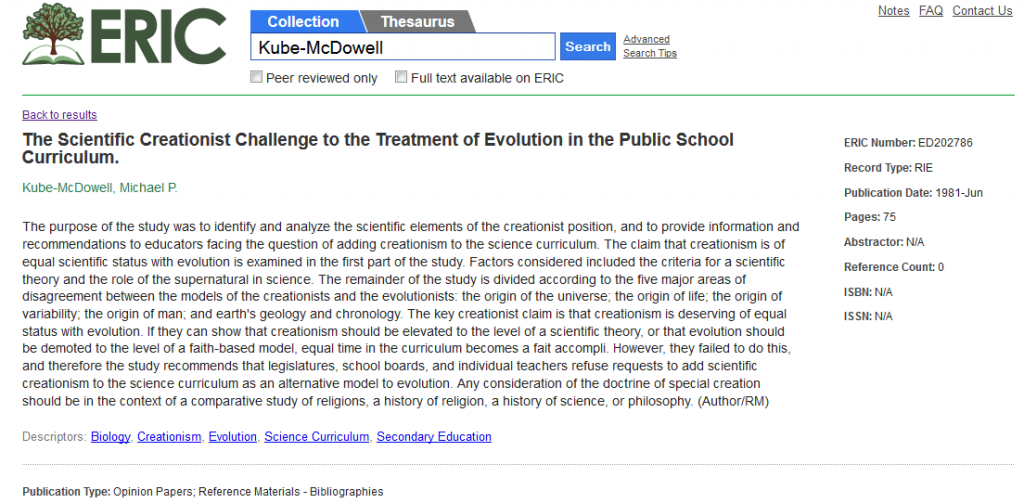Author’s Note (2015)
It’s still there in the ERIC catalog today, sagging under the weight of old dust and a 13-word title. I’m a little surprised, and at the same time pleased.
To the best of my knowledge, only a few copies of it ever existed. I earned not one red florin from them. My own copy is a Xerox of a typescript rubber-banded between cardboard. It was the last work of any length I wrote on my Smith Corona 2200, and the last bit of homework for my M.S. from I.U.S.B.
THE SCIENTIFIC CREATIONIST CHALLENGE TO THE TREATMENT OF EVOLUTION IN THE PUBLIC SCHOOL CURRICULUM
Rolls right off the tongue, doesn’t it? No colons or semi-colons, though. A rookie mistake.
The 1993 Author’s Note explains the rest.
Author’s Note (1993)
Context matters.
In the fall of 1976, I took a job teaching 6th, 7th, and 8th-grade science in a new middle school in Middlebury, Indiana, a small town in Elkhart County. In many ways, it was an ideal place to teach. But by 1981, I had become embroiled in a struggle to keep creationism out of the Heritage Middle School curriculum, and to keep evolution and modern cosmology in–a struggle I ultimately lost.
Two members of the four-member science staff had, over the years, become committed creationists: Tony Hurst, the department chair, and Dale Miller–both long-term Middlebury residents and members of the conservative Mennonite Church. The inevitable and ultimately divisive war over the curriculum ended with a private hearing before Principal James Galt, in which Hurst and Miller presented the case for including creationism and I presented my best case against it.
Seeking peace above all else–including the intellectual integrity of the science curriculum–Galt ruled that neither creationism nor evolution was to be taught at Heritage. The official department position, drafted by Hurst, became, “It is our policy to not teach ‘evolution’ as a science or a philosophy…There is too much of value and importance in other science areas to waste time in such a controversial topic.”
From that day until I left Heritage in June, 1983, I chafed under that restriction, believing that studying biology, geology, or astronomy without the evolutionary perspective was fundamentally absurd. And although I engaged in what guerrilla activity I could within the confines of my own classroom, it was a battle I could never win–a reality which contributed a great deal to my disillusionment with teaching as a profession, and to my willingness to leave the classroom. My friendships with all three men were, to varying degrees, also victims of the conflict.
On March 19, 1981, just weeks before I began work on this paper, the Arkansas legislature passed Act 590, the “Balanced Treatment for Creation-Science and Evolution-Science Act,” requiring that the Biblical and modern scientific views of the origins of man and the universe be given equal time in Arkansas classrooms. On May 27, 1981, an American Civil Liberties Union legal team representing the Rev. Bill McLean, a Presbyterian minister, and 22 other plaintiffs filed suit to prevent the law from going into effect.
When I completed my work shortly thereafter, Dr. [Charles] Duvall and I conspired to send copies to, among others, Wayne Moyer of the National Association of Biology Teachers and Jack Novik of the American Civil Liberties Union. It was our hope that it might reach the right hands to be of some use to the ACLU in preparing their suit against the State of Arkansas and Act 590.
Though I never received any response or acknowledgment from them, I followed the news about the trial that December with great interest. And when U.S. District Court Judge William R. Overton ruled in favor of McLean and the ACLU, and struck down Act 590 as unconstitutional, I allowed myself to feel a measure of personal vindication. I had lost a frustrating battle, but at least the good guys had won the war.
Several years later, I was recalling these events in an on-line discussion in the Science Fiction and Fantasy Forum on CompuServe. By chance, my message caught the eye of Borstal Sweeney, a member of the ACLU legal team for the Arkansas case. His reply to me:
Mike: We did use your [bibliography], and it was one of the most useful materials we found to get us off the ground in the project.
Our trial team/project team was an interesting bunch, and turned out to be extremely well equipped to do the case. The basic complaint was drafted by a radical libertarian (he believes multinational corporations should maintain their own standing armies to defend corporate property from nationalization) and an old-school Southern democrat (harder to describe, but her goal in life, while working as a high-powered corporate litigator in New York, was to go back to Charleston and become one of those rich little old ladies who run the social register, cultural life, and most of the politics there), under the direction of a gay attorney who had handled First Amendment religious matters for the ACLU before. I signed on, bringing a background in philosophy of religion and philosophy of science, plus First Amendment litigation experience. Along the way we picked up a paralegal with a masters from the University of Chicago Divinity School, and a part-time secretary who had taught high school biology and was completing a doctorate in paleontology at the Museum of Natural History.
While continuing to add lawyers to the team, we also picked up a team of non-lawyer experts like Steve Gould, Niles Elridge, Joel Cracraft, Eric Holtzman, and Francisco Ayala (to name only folks from the science side of the case), some who became expert witnesses at trial, others who assisted in the preparation and briefing of the case.
The whole project, at normal billing rates, would have cost well over a million dollars, and all of it was donated; the award of attorneys fees that was finally made by the Court was donated to the ACLU. And, of course, all this effort was only the tip of the iceberg; lots of other people, like you, had paved the way through research, writing, and local political battles.
As you may be able to tell from the length of the message (and I could go on for days), I am extremely proud of having had a hand in the project. I also never had more fun in my life….
Regards,
Borstal
I cannot express how gratifying it was to learn that more than a sideline rooting interest connected the work I’d done with the ruling handed down eight months later. And though my part in it was far smaller and more indirect than that of Jack Novik, Borstal Sweeney, and dozens of others who gave so much of their time and talents to the effort, I, too, am extremely proud of my contribution. In some ways, it still feels like the best and most meaningful work I’ve ever done.
–Michael P. Kube-McDowell
August 27, 1993, Lansing, MI


